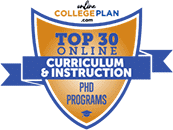
Ed.D. – Curriculum & Instruction
Make a Significant Difference Through an Ed.D. in Curriculum & Instruction
Are you a practitioner-based leader interested in improving current educational programs? Imagine using your influence to shape the future of education and investing in brighter possibilities for you too. Regent’s Doctor of Education (Ed.D.) – Curriculum & Instruction helps you deliver research-supported programs while teaching you how curriculum and instruction can be structured and applied to educational reform.
INCREASE YOUR EARNING POTENTIAL
Capitalize on a higher salary with your doctoral degree.
IMPLEMENT INNOVATIVE APPROACHES
Enhance student engagement by integrating technology into the curriculum.
EXPAND YOUR CAREER PATH THROUGH AN ED.D. IN CURRICULUM & INSTRUCTION
Take your career to the next level with influential leadership opportunities.
Presented from a Christian worldview, the Ed.D. – Curriculum & Instruction is supported by award-winning faculty in Virginia Beach.
Please complete the Request Information form on this page to learn more about this program.
On completing the Ed.D. – Curriculum & Instruction degree, you can:
- Identify best practices through exploring the theories and research behind curriculum and instruction programs.
- Develop evaluation skills valuable in assessing curriculum design and instruction practices.
- Create original research and prepare for publication in refereed conferences, journals, and books.
Career Opportunities
- University Faculty
- Curriculum & Instruction Specialist
- School District Administrator
2024-25 Semester Check-In Deadlines
All students are expected to check-in for the semester two weeks before the session start date. Students should apply, be accepted, enroll in their first courses, and confirm a plan to pay for their courses prior to this date.
| Session | Semester Check-In | Session Start Date |
|---|---|---|
| Session A | Friday, August 9 | Monday, August 19 |
| Session M | Friday, September 6 | Monday, September 16 |
| Session B | Friday, October 11 | Monday, October 21 |
| Session C | Wednesday, January 8 | Monday, January 13 |
| Session T | Friday, January 31 | Monday, February 10 |
| Session D | Friday, March 7 | Monday, March 17 |
| Session E | Friday, May 2 | Monday, May 12 |
| Session F | Friday, June 13 | Monday, June 23 |
Admissions Requirements
Step 1: Apply to Regent University
Submit your application using the Regent University Online Application.
Note: If you are unable to complete our application due to a disability, please contact our Admissions Office at 757.352.4990 or admissions@regent.edu and an admissions representative will provide reasonable accommodations to assist you in completing the application.
Step 2: Submit Your Unofficial Transcripts
Submit your unofficial transcripts to regent.edu/items.
Upon submitting your application, you will receive an email requesting authorization for Regent University to obtain your official transcripts from your U.S. degree-granting institution. International transcripts must be evaluated by a NACES, AACRAO or NAFSA approved agency.
Step 3: Submit Your Government-Issued ID
To ensure academic integrity, Regent University requires a copy of a government-issued ID. Please submit a scanned copy or photograph of it to regent.edu/items.
Please feel free to contact the Office of Admissions at 757.352.4990 or admissions@regent.edu should you have any further questions about the application process.
Note: All items submitted as part of the application process become the property of Regent University and cannot be returned.
PART-TIME STUDENTS
| Degree | Tuition Cost Per Credit Hour | Average Credit Hours Per Semester | Average Tuition Per Semester |
|---|---|---|---|
| Master of Education (M.Ed.) | $565 | 6 | $3,390 |
| Educational Specialist (Ed.S.) | $800 | 6 | $4,800 |
| Doctor of Education (Ed.D.) | $800 | 3 | $2,400 |
| Doctor of Philosophy (Ph.D.) | $800 | 3 | $2,400 |
Full-Time Students
| Degree | Tuition Cost Per Credit Hour | Average Credit Hours Per Semester | Average Tuition Per Semester |
|---|---|---|---|
| Master of Education (M.Ed.) | $565 | 9 | $5,085 |
| Educational Specialist (Ed.S.) | $800 | 9 | $7,200 |
| Doctor of Education (Ed.D.) | $800 | 6 | $4,800 |
| Doctor of Philosophy (Ph.D.) | $800 | 6 | $4,800 |
Student Fees Per Semester
| University Services Fee (On-Campus Students) | $850 (Fall & Spring) $700 (Summer) |
| University Services Fee (Online Students) | $700 |
Part-Time Students
| Degree | Tuition Cost Per Credit Hour | Average Credit Hours Per Semester | Average Tuition Per Semester |
|---|---|---|---|
| Master of Education (M.Ed.) | $565 | 6 | $3,390 |
| Educational Specialist (Ed.S.) | $800 | 6 | $4,800 |
| Doctor of Education (Ed.D.) | $800 | 3 | $2,400 |
| Doctor of Philosophy (Ph.D.) | $800 | 3 | $2,400 |
Full-Time Students
| Degree | Tuition Cost Per Credit Hour | Average Credit Hours Per Semester | Average Tuition Per Semester |
|---|---|---|---|
| Master of Education (M.Ed.) | $565 | 9 | $5,085 |
| Educational Specialist (Ed.S.) | $800 | 9 | $7,200 |
| Doctor of Education (Ed.D.) | $800 | 6 | $4,800 |
| Doctor of Philosophy (Ph.D.) | $800 | 6 | $4,800 |
Student Fees Per Semester
| University Services Fee (On-Campus Students) | $850 (Fall & Spring) $700 (Summer) |
| University Services Fee (Online Students) | $700 |
*Rates are subject to change at any time.
Advanced Standing
Students possessing an Ed.S. or equivalent may be admitted to the Ed.D. program with advanced standing after a review of their post-master’s transcript(s). Offered in a cohort model. Students may begin the program in the spring, summer or fall semesters. Courses are delivered online with some required face-to-face components. School division cohorts are also offered in varying formats.
Faculty
Dr. Finn is the concentration chair for Curriculum & Instruction and is committed to your success.
Dr. Don Finn has been a faculty member since 2006 and served as the School of Education Dean from July 2015-2018. Specializing in Adult Education, he has been an educator for over 25 years and possesses a current Virginia Postgraduate Professional teaching license in secondary education.
Dr. Finn earned his B.S. in Secondary Education, Social Sciences concentration and his M.S. in Curriculum and Instruction with an Adult Education concentration from Radford University. He taught 7th through 12th grade social studies and in the adult night high school program in Montgomery County, Virginia. In 1999, he accepted a position to provide statewide leadership through the Virginia Adult Learning Resource Center located at Virginia Commonwealth University (VCU). While at the VCU School of Education, he served as a collateral faculty member, a grant and project coordinator and instructor. He earned his Ph.D. in Adult Education and Organizational Learning from VCU in 2005.
His service has included leadership at the state and national levels as president of the Virginia Association for Adult & Continuing Education (VAACE) and various appointed roles, and as an elected executive board member for the Coalition on Adult Basic Education (COABE). His COABE service includes: Secretary, Region 2 representative (2013-2015), national conference chairman (2012, 2015, 2018), conference program chairman (2016 & 2017), and President-Elect (2017-2019). He has been a textbook consultant, an article reviewer for select journals, and a consultant to adult education programs in Virginia and other states.
Finn has served on various Regent University committees including chairing the university Curriculum and Instruction Review Committee (CIRC), faculty senator, chairman of the School of Education Doctoral program and the Masters of Curriculum & Instruction (M.Ed.) program. He was named the School of Education Outstanding Faculty Member in 2010, VAACE Outstanding Adult Education Leader in 2013 and received the 2014 VAACE President’s Award for outstanding service.
Finn has authored and co-authored numerous articles and book chapters about effective instructional practices for adult learners, university professors and other diverse learners.




